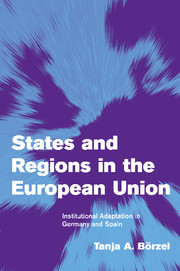Book contents
- Frontmatter
- Contents
- List of figures
- List of tables
- Acknowledgements
- List of abbreviations
- Introduction
- Part I Europeanization and domestic institutional change: A historical institutionalist approach
- Part II Reinforcing cooperative federalism: Institutional adaptation to Europeanization in Germany
- Part III Transforming competitive regionalism: Institutional adaptation to Europeanization in Spain
- Part IV Sharing versus shifting the costs of adaptation: The Europeanization of environmental policy-making in Germany and Spain
- Conclusions: Toward convergence in Europe?
- Appendix: The major EU environmental policies of the policy study
- List of references
- Index
Conclusions: Toward convergence in Europe?
Published online by Cambridge University Press: 22 September 2009
- Frontmatter
- Contents
- List of figures
- List of tables
- Acknowledgements
- List of abbreviations
- Introduction
- Part I Europeanization and domestic institutional change: A historical institutionalist approach
- Part II Reinforcing cooperative federalism: Institutional adaptation to Europeanization in Germany
- Part III Transforming competitive regionalism: Institutional adaptation to Europeanization in Spain
- Part IV Sharing versus shifting the costs of adaptation: The Europeanization of environmental policy-making in Germany and Spain
- Conclusions: Toward convergence in Europe?
- Appendix: The major EU environmental policies of the policy study
- List of references
- Index
Summary
The concluding chapter summarizes the empirical comparative study in light of the theoretical propositions generated by my Institution Dependency Model. I argue that the findings challenge dominant approaches in the field of European studies, which cannot explain the differential effect of Europeanization on the territorial institutions of Germany and Spain. I then discuss the scope of my model. Drawing on other empirical studies, I maintain that the Institution Dependency Model is generalizable enough to analyze the domestic impact of Europe across different policy areas, member states, and institutions. I also propose areas for future research where the model could provide new insights. I conclude by considering implications of my theoretical argument and empirical findings for the European system of governance. The Institution Dependency Model should lead us to expect some “clustered convergence” among member states that face similar pressure for adaptation. If these expectations hold, the prospects of a “Europe of the regions” are rather gloomy. Moreover, the participation of the regions in European policy-making will increase rather than decrease the democratic deficit of the European Union.
The domestic impact of Europe: Transformation versus reinforcement
The book started with an empirical puzzle. Europeanization has caused some considerable changes in the territorial institutions of Germany and Spain. These changes converge around the participation of the Spanish Comunidades Autónomas and the German Länder in European policy-making through cooperation with the central state rather than through direct relations with European institutions.
- Type
- Chapter
- Information
- States and Regions in the European UnionInstitutional Adaptation in Germany and Spain, pp. 211 - 233Publisher: Cambridge University PressPrint publication year: 2001

